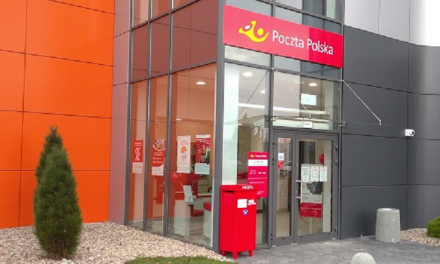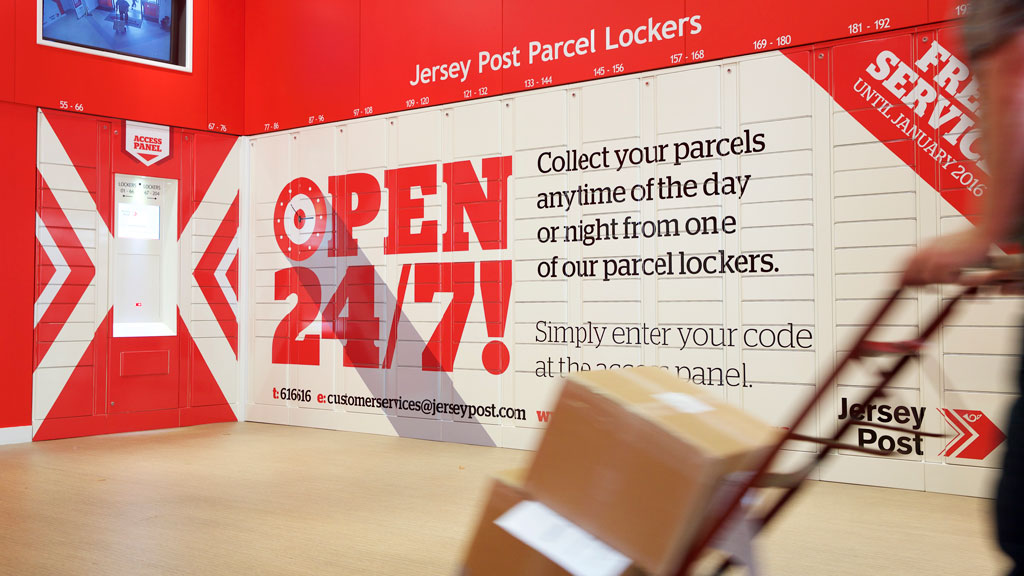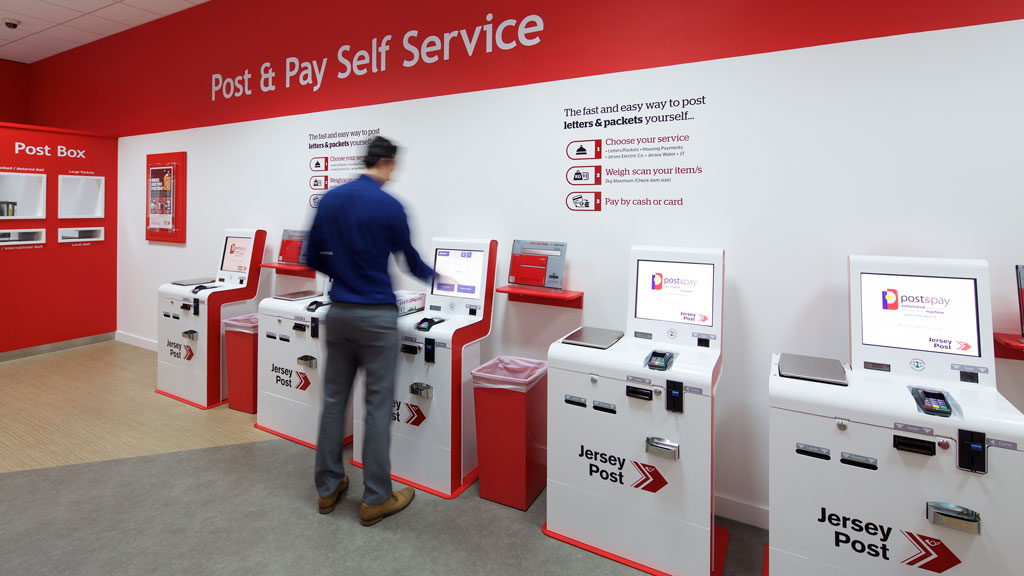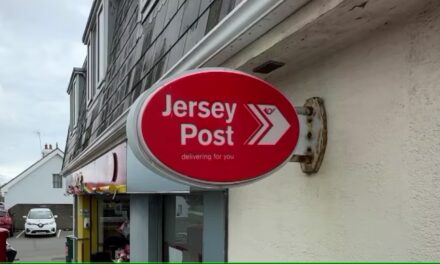
CEO Interview: Tim Brown, Jersey Post

This article is an extract from an interview that will be published in the upcoming Spring Edition of MER Magazine published in February 2018. Read other articles from MER by visiting digital.mailandexpressreview.com.
Tim Brown
CEO of Jersey Post talks to MER’s Ian Taylor
If you want to understand how the post and parcel world has changed over the past decade and, even more importantly, where its future may lie, the island of Jersey could be the perfect microcosm. Indeed, MER thought Jersey would make such an excellent case study that we invited the company’s Chief Executive Officer Tim Brown to be the subject of our first “CEO Interview”.
Jersey has some good credentials for being representative of the world in miniature.
Firstly, the island is undeniably small, with an area of just 118 square kilometres and a population of around 100,000. Furthermore, Jersey has certainly reflected many of the trends that are shaping the world today, as its economy has diversified from a traditional agricultural base to embrace financial services, information technology and cross-border e-commerce.
Historical Connections
Jersey is also familiar with the shifting sands of European power blocs. This is a subject which is very much on the international agenda at the moment as the United Kingdom is looking to exit the European Union. The Channel Islands – the archipelago which includes Jersey, Guernsey as well as a spray of smaller islands, rocks and reefs – became part of the Duchy of Normandy, and then the English Crown, more than a thousand years ago.
The connection to the English Crown still stands today. Jersey is a “Crown dependency” with a Lieutenant Governor who serves as the representative of the Queen, but the island is not actually a part of the United Kingdom. Jersey has its own parliament, judicial system, legal tender, and – of particular interest to MER readers – its own postal operator, Jersey Post.
Jersey Post can trace its roots back to 1794 when Jersey’s postal service was introduced when weekly sailings to Weymouth were established. Jersey Post International Limited was established in 1969, when the governments of Jersey and Guernsey took over the running for their respective postal services and UK stamps were no longer valid in the Crown dependencies.
In the mid-2000s, Jersey – like many of its European counterparts – opened up its postal market to competition. In July 2006, Jersey Post was incorporated as a limited liability company and licensed by the Jersey Competition Regulatory Authority as the universal service provider.
In the decade that has passed since its incorporation, Jersey Post has faced significant challenges and seen fundamental changes in the nature of the global post and parcel industry.
The Digital Age
The underlying force driving many of these changes is “digitalisation”. With the proliferation of electronic communication – through emails, SMS texts and social media – there has been a dramatic drop in traditional letter volumes. This has been a significant, and continuing, problem for postal companies the world over. The brighter flip side of digitalisation, however, has been the exponential growth in e-commerce. People are now buying goods online in ever-increasing volumes; and they are buying a much wider range of goods online, from car parts to musical instruments and groceries. This explains why postal operators worldwide have been investing in their parcel operations so that new revenue streams can be maximized in order to support their traditional mail business.
While some postal companies have been content to follow the trends, Jersey Post has been one of the leaders. The company has risen to the digital challenges by forging relationships with retailers, as well as building cross-border bridges with other logistics operators. Jersey’s geographical nature has, of course, been an important factor.
As island-dwellers, the people of Jersey have been particularly enthusiastic online shoppers, because they can now use the worldwide web to buy a cornucopia of goods that would previously have been unobtainable on the local high street. Jersey Post has been steadily building up its capacity to satisfy this growing hunger.
Essentially, it is a win-win strategy for Jersey Post and the Jersey people. Jersey Post raises its international profile, diversifies its services and generates new revenues that ensure it is not so reliant on its traditional postal business. Meanwhile, the island’s inhabitants have access to a global parcel network and a sustainable universal service.
“It is a win-win strategy. Jersey Post raises its international profile, diversifies its services and generates new revenues that ensure it is not so reliant on its traditional postal business. The people of Jersey have access to a global parcel network and a sustainable universal service.”
Before we go on to look at how Jersey Post has built up its parcel logistics and e-commerce capabilities, we should first recognize just how seriously the company’s mail business has been affected by digitalisation. Letter volumes have fallen by two-thirds over the past decade and the decline is continuing. Indeed, Jersey Post’s Tim Brown tells us that postal volumes are currently falling by between 7% and 8% a year, whereas parcel volumes are increasing by around 12% to 15%. Today, less than 30% of Jersey Post’s revenues now come from mail.
Faced with these numbers, says Brown, Jersey Post has recognized that it has to function as “a parcels business which does mail”. In order to do this, says Brown, the company has made significant operational changes and, just as importantly, undergone a “big cultural transition”.
Jersey Post has about 250 “front line” staff out of a total workforce of around 400. Meeting the legal duty to provide a comprehensive postal service is a key target for Jersey Post and it entails the maintenance of a costly logistics infrastructure. However, Jersey Post has shown that it can turn this infrastructure (and the logistics expertise that comes with it) into a revenue-generating resource by tapping into the e-commerce market.
E-Commerce deliveries in Jersey
When we conducted our interview with Tim Brown in early December, Jersey Post was finalising an agreement with the biggest name in online retailing, Amazon.
Alongside its direct arrangements with retailers, Jersey Post also uses its infrastructure on the island of Jersey to work as a delivery partner for other logistics and postal companies. Jersey Post has a strong historical connection with its counterpart in the UK, Royal Mail – and the two companies maintain a strong relationship to this day. However, Jersey Post also works with Royal Mail’s key competitors, including Yodel and UK Mail (which is now part of the Deutsche Post DHL Group network). Indeed, Brown says that Jersey Post is happy to explore “coopetition” opportunities with a range of Posts.
Jersey Post is, of course, acutely aware that the parcel delivery business is not only a growing market; it is also a highly competitive one. Jersey may be an island, but its inhabitants are not a captive market.
“There are a number of parcel delivery companies operating in Jersey – including Hermes and DPD,” says Brown. “So, while the island’s parcel delivery market is growing, we have to compete hard for our share of it.”
Tim Brown, CEO of Jersey Post will be speaking at the World Mail & Express Americas Conference in Miami in February 2018. Visit the conference website to find out more…
This article is an extract from an interview that will be published in the upcoming Spring Edition of MER Magazine published in February 2018. Read other articles from MER by visiting digital.mailandexpressreview.com.
SUBSCRIBE TO MER For FREE
This article is an extract from an interview for MER Magazine. To read the full interview subscribe to MER for free today. MER is the industry leading magazine for professionals in the mail, express and e-commerce sectors. Packed with original content, thought-provoking features and interviews with key industry leaders, MER is the must-read publication for those who want the inside track on the industry.




















